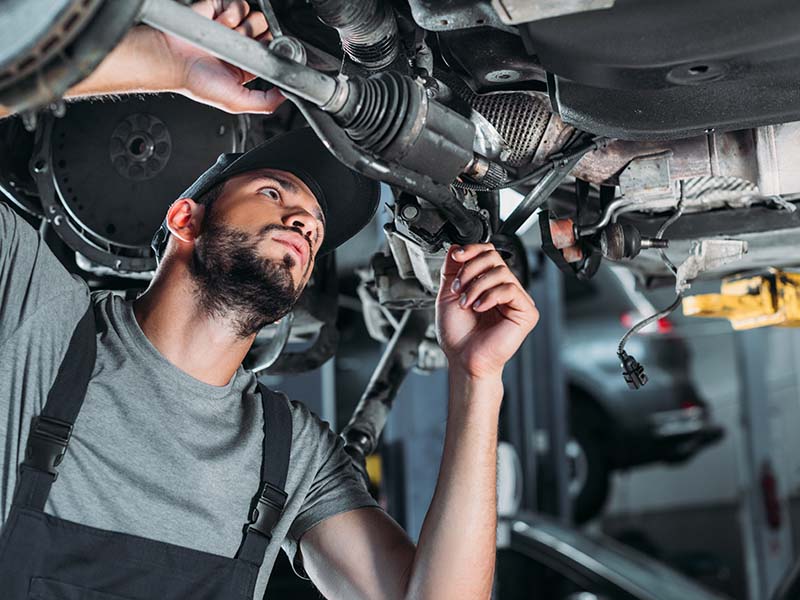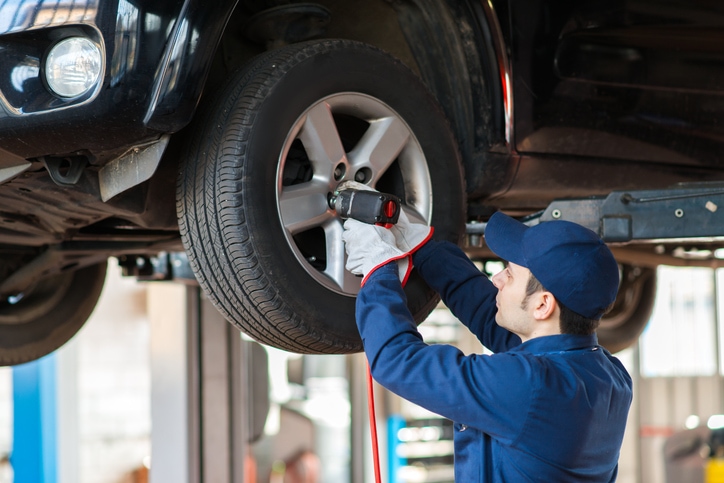All Categories
Featured
Modern vehicles are progressively dependent on complicated electrical systems to power everything from the engine to the infotainment system. With advanced innovations like electrical and hybrid powertrains, state-of-the-art sensing units, and integrated computer systems, diagnosing electrical problems has become an extra elaborate process for automobile repair service shops.
For instance, if the check engine light comes on, the OBD-II scanner will certainly provide a code that suggests whether the problem lies with the fuel system, ignition system, and even a damaged sensing unit. This instant information assists technicians limit the cause of the electric concern, whether it's a damaged generator, sensor malfunction, or a falling short battery.
![]()
By extensively checking out these components, technicians can recognize any loosened connections, harmed cables, or components that are revealing signs of deterioration. This evaluation is vital for spotting problems that may not be right away obvious in the diagnostic codes yet are visible to the service technician.
![]()
A multimeter is utilized to determine the battery's voltage, ensuring it drops within the correct variety. A healthy and balanced, totally billed battery normally checks out around 12.6 volts when the vehicle is off. Additionally, professionals may check the alternator's ability to charge the battery while the engine is running, guaranteeing that it is producing the correct voltage (usually around 13.7 to 14.7 volts) It can cause electrical failings throughout the vehicle. if either the battery or generator is stopping working.
Additionally, with the increase of facility systems like lane-assist, adaptive cruise control, and car parking sensors, analysis devices enable technicians to evaluate exactly how electrical signals are being sent to and from these systems to make sure proper functionality.
If the problem is software-related, a professional might carry out a software program reset, upgrade, or reprogram specific modules to restore correct capability. This is specifically appropriate for issues like malfunctioning infomercial systems, sensing unit calibration mistakes, or malfunctioning powertrain control components.
![]()
In enhancement, contemporary cars commonly have progressed security functions, such as digital security control and collision-avoidance systems, that depend heavily on sensing units and control modules. These systems can be inspected making use of specialized analysis tools to guarantee they are working properly.
Conclusion. Diagnosing electric problems in modern lorries is a specific and detailed process that needs specialized devices and understanding. Normal upkeep and timely attention to electrical problems are crucial for keeping modern vehicles running efficiently and securely.
- Using OBD-II Scanners for Diagnostics. One of the primary steps in diagnosing electric issues in contemporary cars is to attach an OBD-II (On-Board Diagnostics) scanner to the auto's diagnostic port. This standard tool enables specialists to recover problem codes from the vehicle's computer, which can pinpoint malfunctioning elements. The OBD-II system keeps track of different electrical elements, including sensors, electrical wiring, and modules, and offers error codes associated with certain issues.
For instance, if the check engine light comes on, the OBD-II scanner will certainly provide a code that suggests whether the problem lies with the fuel system, ignition system, and even a damaged sensing unit. This instant information assists technicians limit the cause of the electric concern, whether it's a damaged generator, sensor malfunction, or a falling short battery.

- Visual Evaluation of Electrical Parts. As soon as the service technician fetches appropriate codes, the next action includes a visual examination of the electric elements. This consists of checking the battery, alternator, integrates, wiring, connectors, and relays. A worn-out battery cord can trigger recurring power concerns, or a rusty terminal could disrupt electrical flow.
By extensively checking out these components, technicians can recognize any loosened connections, harmed cables, or components that are revealing signs of deterioration. This evaluation is vital for spotting problems that may not be right away obvious in the diagnostic codes yet are visible to the service technician.

- Billing and evaluating the battery System. The battery and billing system are central to the car's electrical system, and numerous electrical issues come from problems with these parts. To ensure they are functioning appropriately, auto service center will execute a series of examinations.
A multimeter is utilized to determine the battery's voltage, ensuring it drops within the correct variety. A healthy and balanced, totally billed battery normally checks out around 12.6 volts when the vehicle is off. Additionally, professionals may check the alternator's ability to charge the battery while the engine is running, guaranteeing that it is producing the correct voltage (usually around 13.7 to 14.7 volts) It can cause electrical failings throughout the vehicle. if either the battery or generator is stopping working.
- Performing Circuit Examinations. Electrical circuits in contemporary cars are detailed, with cords attaching multiple parts like lights, actuators, and sensing units. Vehicle repair service stores use circuit testers to check for power circulation or possible issues within the circuitry.
Additionally, with the increase of facility systems like lane-assist, adaptive cruise control, and car parking sensors, analysis devices enable technicians to evaluate exactly how electrical signals are being sent to and from these systems to make sure proper functionality.
- Software Application Diagnostics and Updates. Modern cars are furnished with a series of software that regulates electrical systems. Often, electrical problems arise due to software program problems or out-of-date software program. Car repair work stores can link to the lorry's computer system to look for any kind of software application updates or patches that could deal with electrical malfunctions.
If the problem is software-related, a professional might carry out a software program reset, upgrade, or reprogram specific modules to restore correct capability. This is specifically appropriate for issues like malfunctioning infomercial systems, sensing unit calibration mistakes, or malfunctioning powertrain control components.
- Specialized Screening for Advanced Electrical Solutions. With the arrival of electric and hybrid cars, the intricacy of electrical systems has expanded also additionally. These automobiles have high-voltage battery systems, electric drive motors, and advanced power management systems that call for specialized analysis devices. Car repair shops equipped to deal with these cars will make use of sophisticated equipment created for high-voltage testing, making sure that the electric motor, power, and battery systems are operating as expected.

In enhancement, contemporary cars commonly have progressed security functions, such as digital security control and collision-avoidance systems, that depend heavily on sensing units and control modules. These systems can be inspected making use of specialized analysis tools to guarantee they are working properly.
Conclusion. Diagnosing electric problems in modern lorries is a specific and detailed process that needs specialized devices and understanding. Normal upkeep and timely attention to electrical problems are crucial for keeping modern vehicles running efficiently and securely.
Latest Posts
Check Out Outstanding Vehicle Maintenance Services from Montclare Auto Repair – Keep Your Car Running Smoothly
Published en
1 min read
When to Tell When Your Car Needs Professional Auto Repair at Montclare Auto Repair
Published en
1 min read
Protect Your Home with Top Quality Residential Roofing
Published en
1 min read
More
Latest Posts
Check Out Outstanding Vehicle Maintenance Services from Montclare Auto Repair – Keep Your Car Running Smoothly
Published May 29, 25
1 min read
When to Tell When Your Car Needs Professional Auto Repair at Montclare Auto Repair
Published May 22, 25
1 min read
Protect Your Home with Top Quality Residential Roofing
Published May 21, 25
1 min read